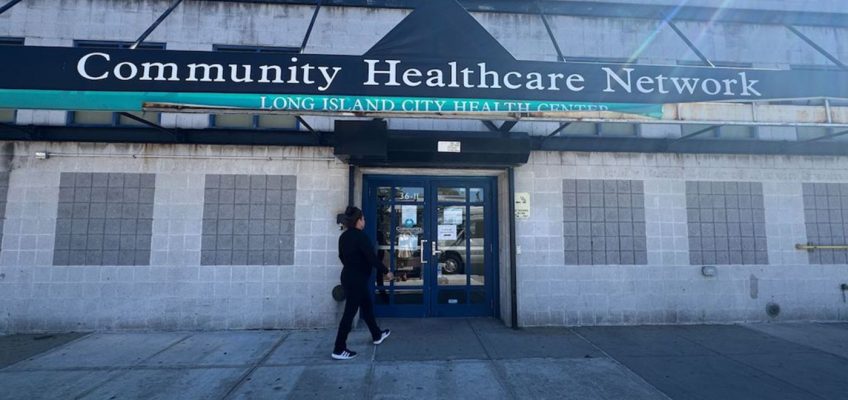Shalina Chatlani, Stateline.org
NEW YORK — On a busy street in Queens, New York, just around the corner from a halal hot chicken sandwich restaurant and a barber shop, the Long Island City Health Center welcomes its patients into a brightly lit waiting room, painted baby blue and filled with soft white and gray seats.
How do you know if you have a gambling problem?
How many steps do you need? Researchers found 4,000 steps led to benefits for older group
Contaminated meat was linked to 1 in 5 UTIs, according to a study
Private Medicare, Medicaid plans exaggerate in-network mental health options, watchdogs say
‘Chemtrail’ theories warn of health dangers from contrails. The idea takes wing at Kennedy’s HHS
A woman working behind the desk on a recent weekday answered one patient’s questions in Spanish. Other patients came dressed in hijabs, kurtas or other traditional clothing from countries around the globe. A caseworker assigned to the center rolled one woman, wheelchair-bound because of a stroke, toward an examination room.
The Long Island City Health Center is part of a national network of more than 1,300 community health centers, safety-net clinics that served more than 31 million patients in 2023, according to KFF, a health research nonprofit. The clinics are located in areas where there aren’t many doctors or hospitals, and they provide care to all patients, regardless of their ability to pay.
Thanks largely to their broad reach, the centers have long enjoyed bipartisan support. But the federal government shutdown, freezes to federal grants, looming cuts to Medicaid and new Trump administration policies barring some immigrants from receiving care at the centers have put them under financial stress.
Community health centers disproportionately serve low-income people, people of color and rural residents. In 2023, 90% of patients had incomes at or below 200% of the federal poverty level, according to KFF. Forty percent of patients were Hispanic, 17% were Black and 31% were rural residents.
More than 80% of patients were insured, and about half of all patients were covered by Medicaid.
The health centers are funded by the payments they get from Medicaid, Medicare and private insurers, plus federal and state grants. Money is always tight, but between 2010 and 2023, average operating margins remained in the black. That changed last year, as the average margin dipped to -2.1%, according to an audit conducted by the National Association of Community Health Centers.
Half of community health centers have fewer than 90 days of cash on hand, and one-quarter operate with margins below -4%, according to the audit.
When the Trump administration froze some federal grants in February, it forced some clinics, particularly in rural areas, to reduce hours or shut down. The broad domestic policy law President Donald Trump signed July 4 is projected to increase the number of uninsured patients seeking care at the health centers. And the ranks of the uninsured would grow further if Affordable Care Act insurance plans get much more expensive at the end of this year, as would happen if Congress fails to extend tax credits that have kept prices down.
Meanwhile, the government shutdown has prevented Congress from renewing the Community Health Center Fund, which expired on Sept. 30 and provides about 70% of the centers’ federal funding. And the centers worry that a new Trump administration policy barring them from providing care to some immigrants would force them to dedicate scarce resources to verifying patients’ legal status. A federal judge has temporarily blocked the change.
Andrew G. Nixon, director of communications for the U.S. Department of Health and Human Services, told Stateline that the administration is “fully committed to protecting America’s community health centers, which play a vital role in serving millions of families nationwide.”
“The Trump Administration is working to reopen the government and restore full funding, while also ensuring that federal resources are prioritized for American citizens and lawful residents in accordance with the law,” Nixon said in an emailed statement.
This year, some states— including Connecticut, Illinois and Minnesota — approved more money for community health centers. But Illinois and Minnesota also have scaled back or ended health care programs that served low-income people regardless of their immigration status, which might prompt more of those patients to seek care at the centers. And California Democratic Gov. Gavin Newsom in June signed a state budget that bars immigrants who are here illegally from enrolling in the state’s Medicaid program.
“Historically, health centers have had bipartisan support, but we’re operating in a very different world now,” Feygele Jacobs, a professor of health policy and management at George Washington University, told Stateline.
Jacobs said health centers are a target for the Trump administration because they serve people of color, low-income residents, immigrants and the uninsured.
“It’s those very communities that are really being challenged right now by the administration,” Jacobs said. “So I don’t know that the focus is so much on health centers as entities, but really more on an administration whose views are antithetical to many of the people that health centers have historically cared for.”
But Chris Pope, a senior fellow at the conservative-leaning Manhattan Institute, questioned whether the Medicaid changes included in Trump’s One Big Beautiful Bill Act would lead to a significant increase in the number of people without insurance or a dramatic reduction in the program’s finances.
Pope also noted that the law doesn’t take direct aim at the federal funding of community health centers.
“There’s no direct cut in terms of reimbursement for community centers,” Pope said. “It’s not the intent of the bill to slash and attack health center revenues.”
Welcoming culture
The first community health centers were created in 1965 in Mississippi and Massachusetts as federal demonstration projects under President Lyndon Johnson’s War on Poverty. The program became permanent in 1975.
Doctors at the Long Island City Health Center describe it as a one-stop shop for patients. In addition to providing primary care and mental health services, the center has an in-house pharmacy and provides laboratory tests, vaccinations, drug treatment, HIV/AIDS treatment, and support for transgender patients and their families. Including its dozen medical residents, the center has doctors who can speak French, Tamil, Kru, Ibo, Yoruba, Spanish, Hindi, Nepali, Russian and Tagalog, among other languages.
Dr. Libby Brubaker, an attending physician at the Long Island City Health Center, told Stateline that providing a welcoming atmosphere for everybody is at the core of the center’s mission.
“Our social workers go to bat for our patients and help them get access to housing. … We write letters to allow our patients with asthma to be able to have air conditioners inside their apartments,” Brubaker said.
“Really what we’re providing for our patients is all encompassing, and that sets us apart,” she added. “Hospitals don’t do all of those things. They do some, but being able to offer that breadth of services in an outpatient setting is invaluable.”
Sandra Tapía visits the Long Island City Health Center. She likes this clinic because she can speak in her native Spanish. (Shalina Chatlani/Stateline/TNS)
Sandra Tapía, a Long Island City resident from Bogotá, Colombia, walked into the clinic on a Friday to see her nutritionist for the first time. She’s been in the U.S. for seven years, is a green card holder and has Medicaid. She said she likes the center because “it’s close and it’s safe.”
Tapía said she can’t imagine not being able to have access to health care, and values being able to speak to her provider in her native Spanish.
“Here, they offer really great services,” Tapía said. “I don’t want people without as many resources, like me, to be punished.”
The idea of cuts frightens patients such as Olga Scott, 65, who said she has been coming to Long Island City Health Center for years. Scott lives in the Bronx, but takes an hourlong subway ride to the center so she can see her favorite doctor.
“These community health services around the whole community of these five boroughs are needed — it’s really needed,” she said. “I just hope that they don’t do too much cutbacks, because we need every service we can get.”
Dr. Sindhura Manubolu, director of the family medicine program at the center, said she’s sensing “a lot of anxiety” from her patients, especially those who rely on Medicaid.
Dr. Sindhura Manubolu is the director of the family medicine program at the Community Healthcare Network’s Long Island City Health Center. (Shalina Chatlani/Stateline/TNS)
“Most of the questions from our patients have been around, ‘Oh, will we lose coverage?’” said Manubolu, who is an immigrant from India. “For someone to be here in an advanced country like America, and then not being able to access the health care that probably is even available to a person in a less developed country is not acceptable.”
Bipartisan support
On Capitol Hill, community health centers are an increasingly rare example of bipartisan agreement.
In May, Republican U.S. Sen. Roger Wicker of Mississippi and Democratic U.S. Sen. Jack Reed of Rhode Island wrote a joint letter to the chairperson and ranking member of the Senate health appropriations subcommittee, urging them “to provide robust funding” for community health centers, describing them as “a bipartisan solution to keeping Americans healthy and saving taxpayer dollars.”
Wicker and Reed argued in the letter that the centers save the overall health care system billions of dollars by reducing the burden of chronic disease through prevention and early intervention, and lower long-term Medicaid and Medicare spending by curbing expensive emergency department visits, hospital admissions and invasive procedures. The senators also noted that the centers employ more than 310,000 people and generate more than $118 billion in economic activity.
“Republicans in particular have always argued that one of the reasons for not pushing for more insurance coverage was the fact that we have these centers,” said Dr. Georges Benjamin, executive director of the American Public Health Association, which advocates for broader health care access.
Benjamin noted that the centers’ importance to rural, mostly Republican communities has heightened their broad-based appeal. He said draining money from them “is not a rational decision.”
“The administration has a nonsensical and uncoordinated health policy overall,” Benjamin said. “These important things that keep people alive and keep them healthy are getting caught in this very bad public policy time we’re having.”
But Robert Hayes, president and CEO of the Community Healthcare Network, the largest network of community health centers in New York City, said the centers there are determined to do what they have always done, regardless of the current challenges.
“We are secure. We’re obeying the law. We’re doing the right thing,” Hayes said. “I don’t mean to dismiss the anxiety that is around health care for the vulnerable these days, but our job is to not let it distract us from what we have to do, which is important and very hard to do: [provide] the most fundamental and primary and preventative health care for people who are basically excluded from the health care system.”
Stateline reporter Shalina Chatlani can be reached at schatlani@stateline.org.
Stateline is part of States Newsroom, a national nonprofit news organization focused on state policy.
©2025 States Newsroom. Visit at stateline.org. Distributed by Tribune Content Agency, LLC.




